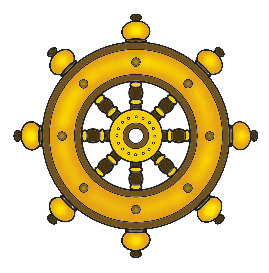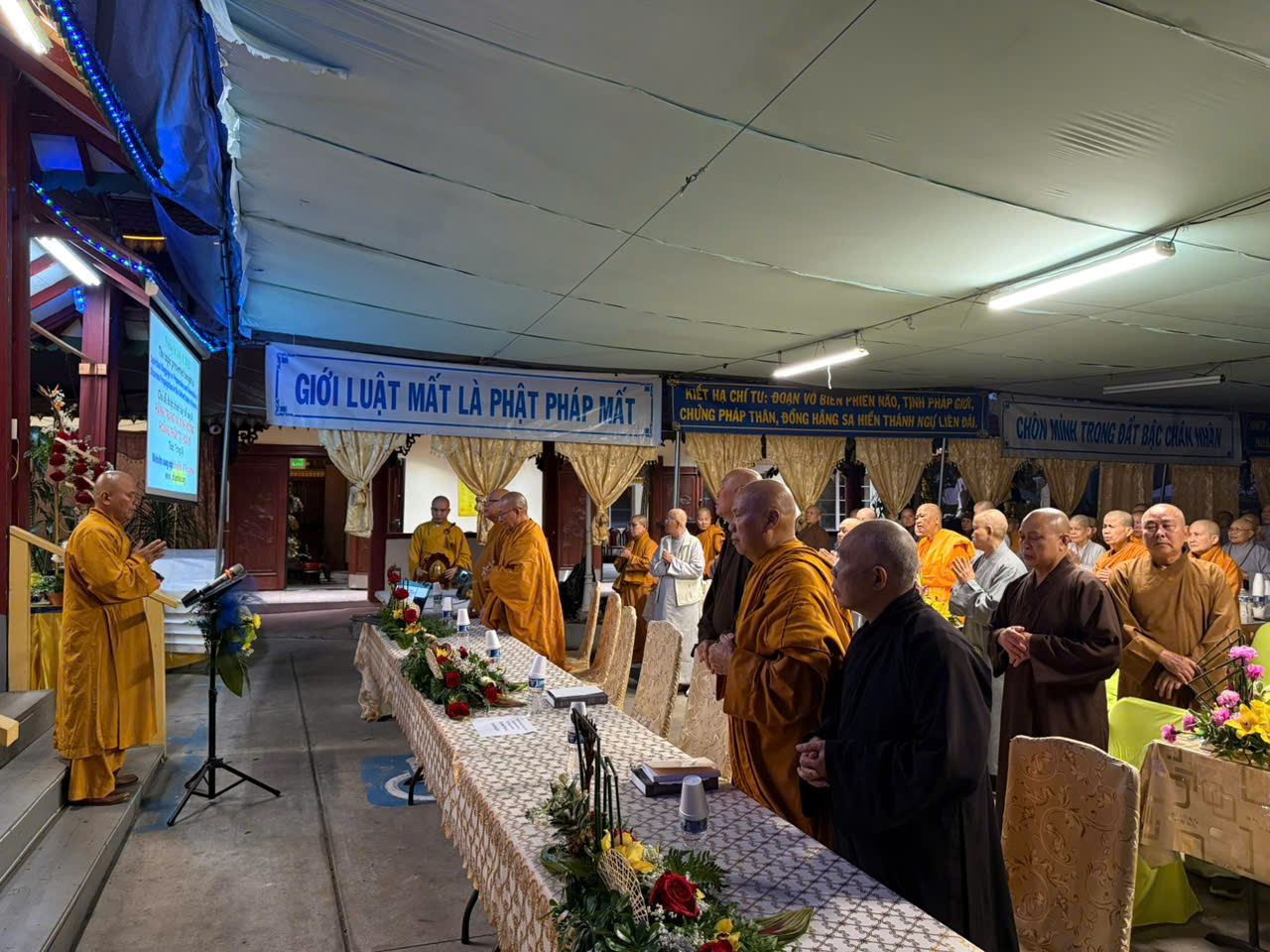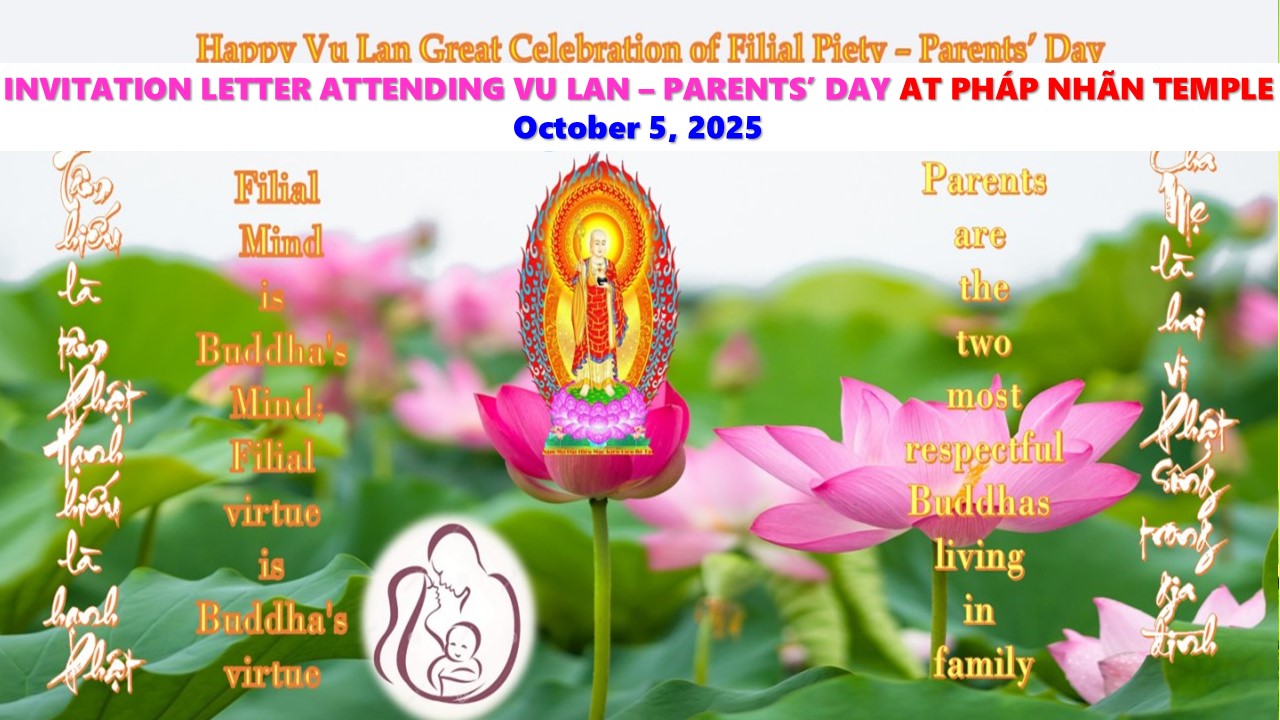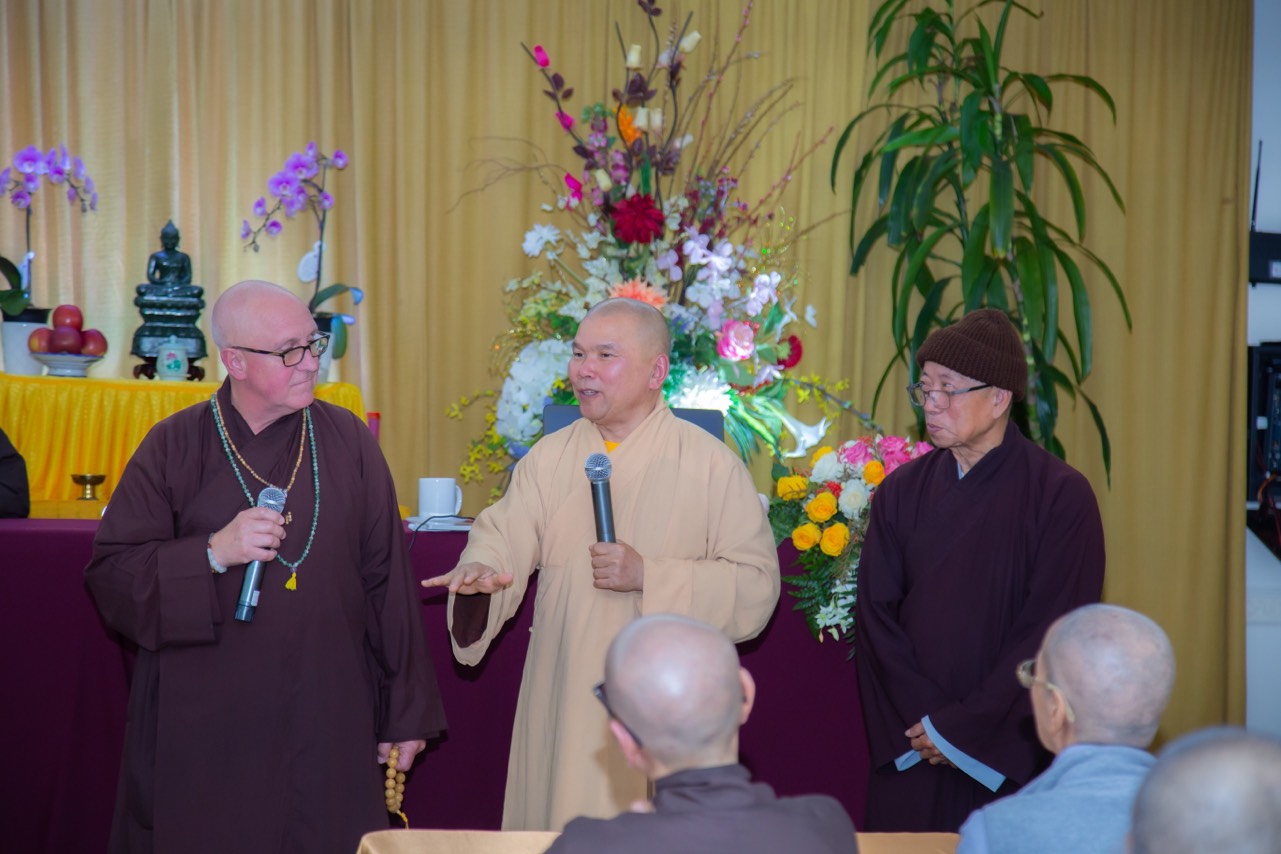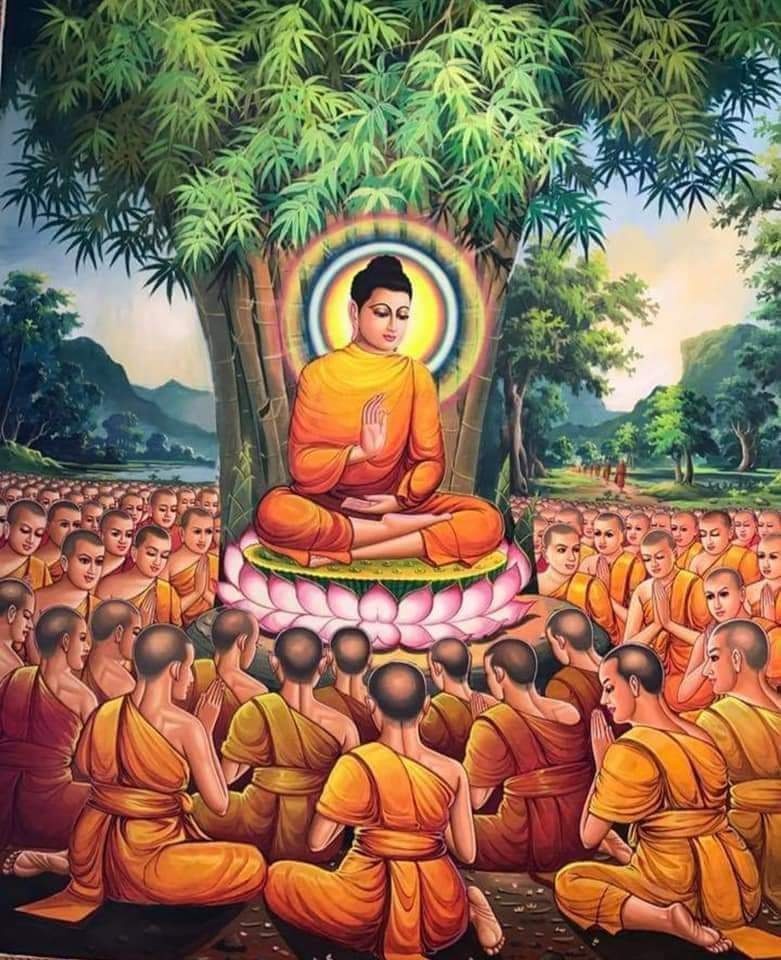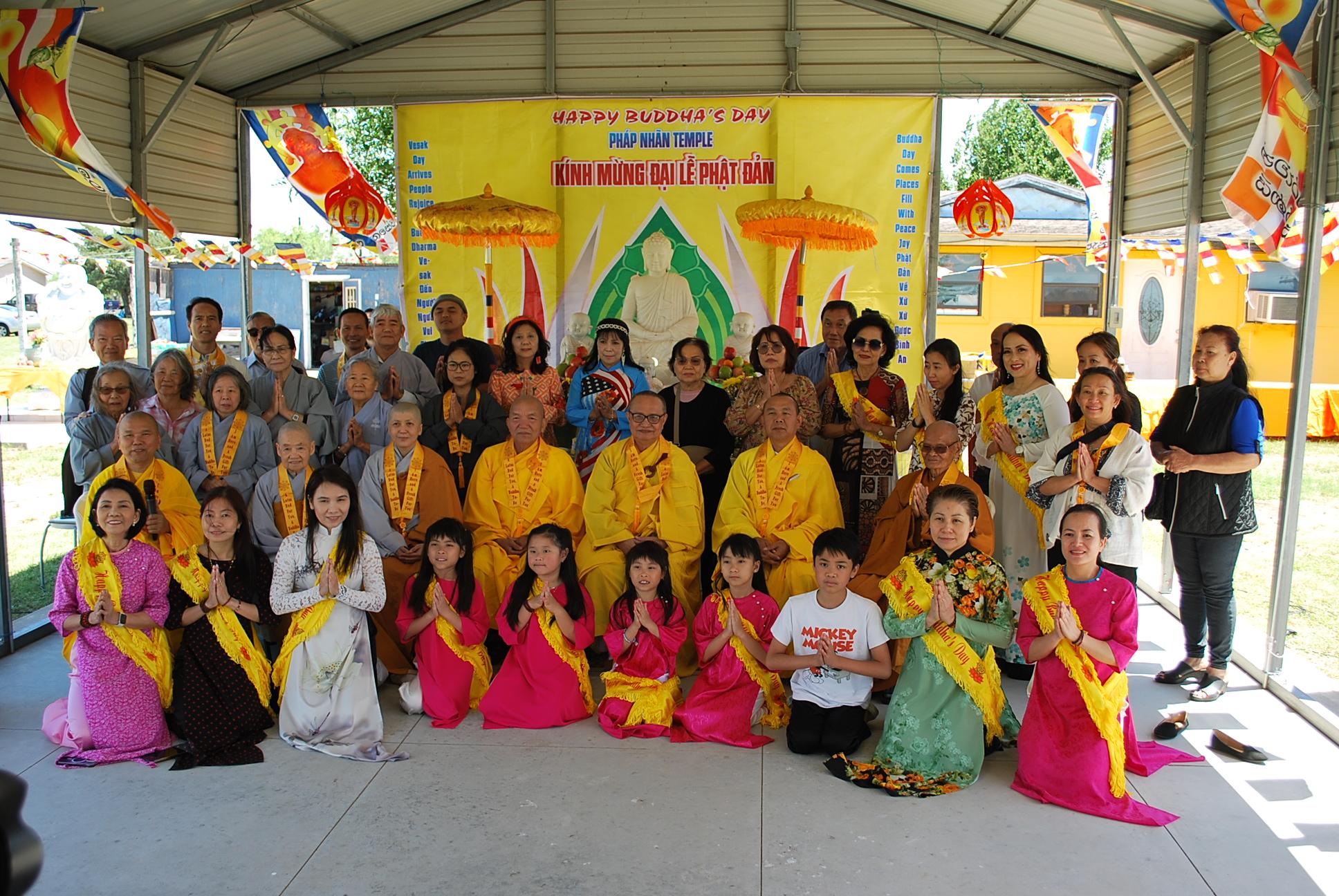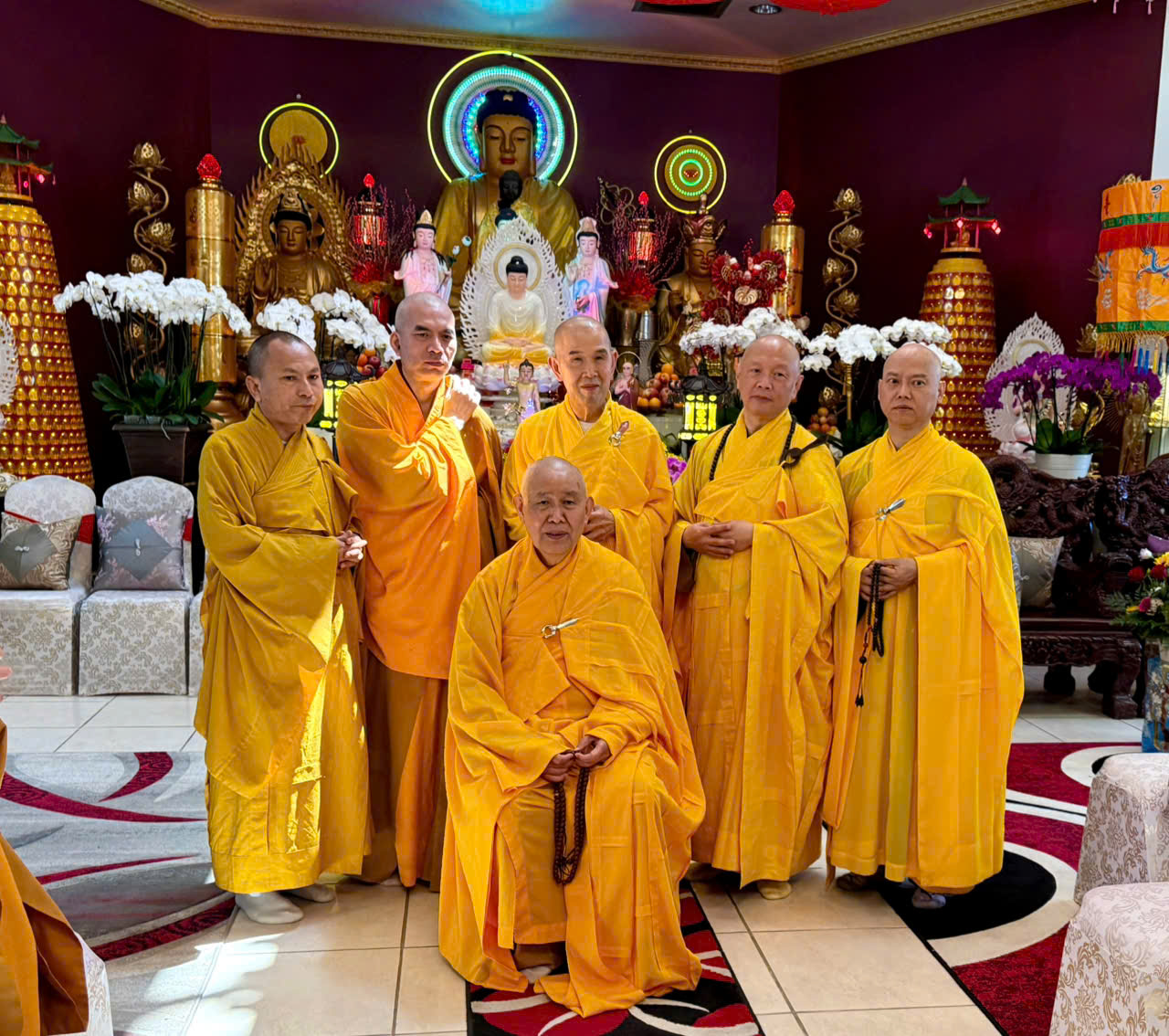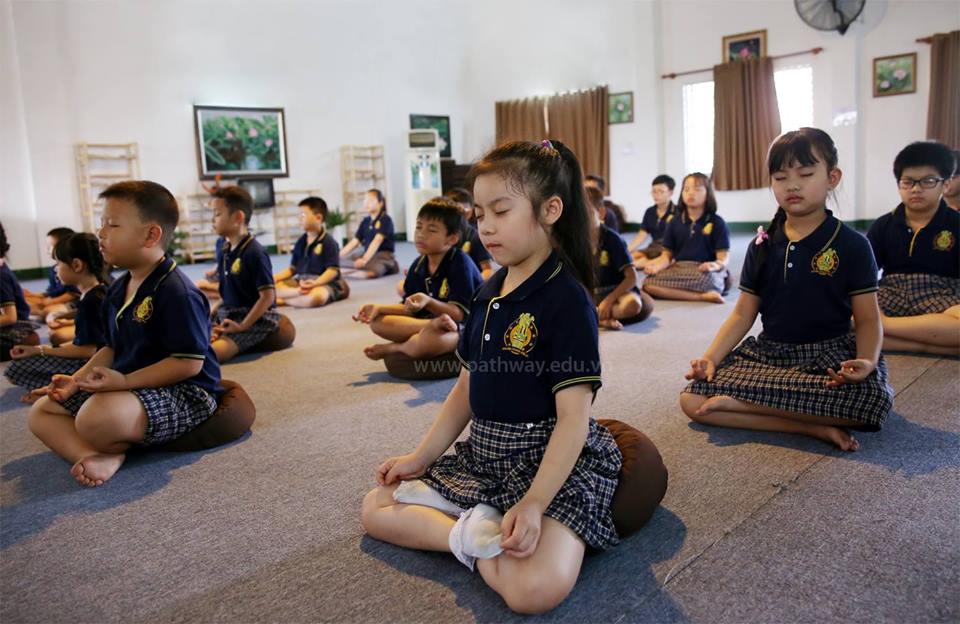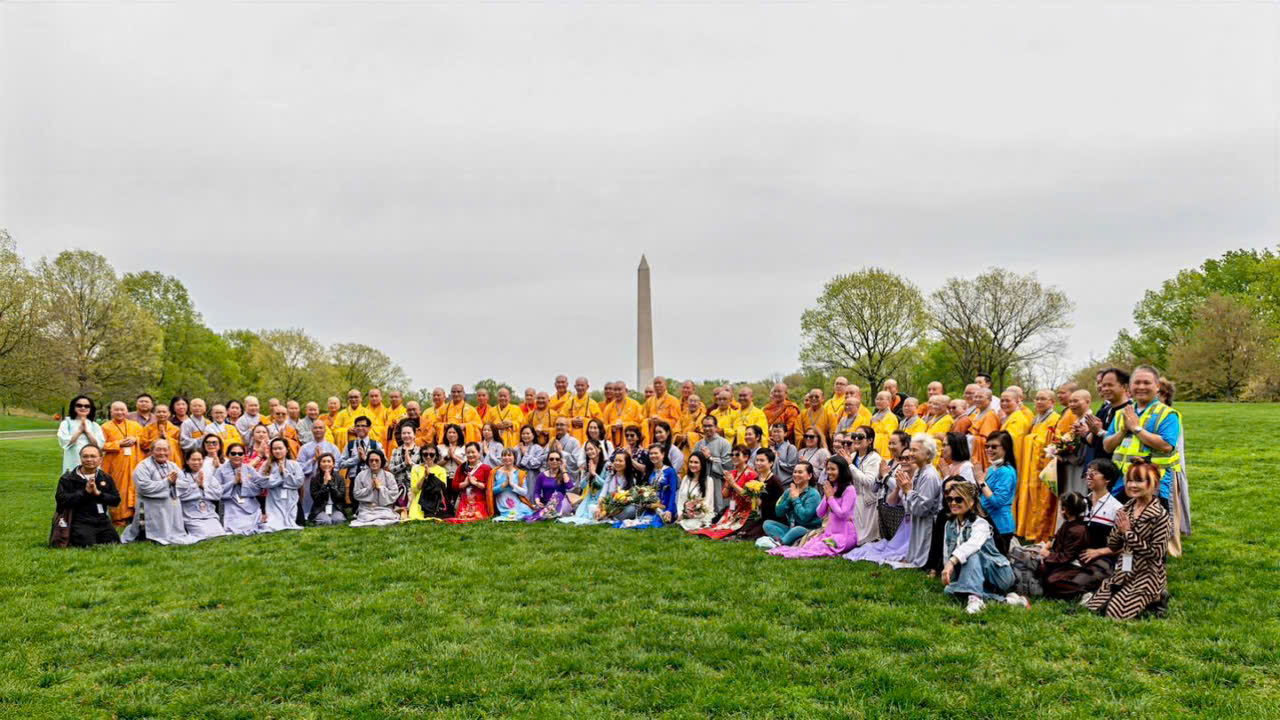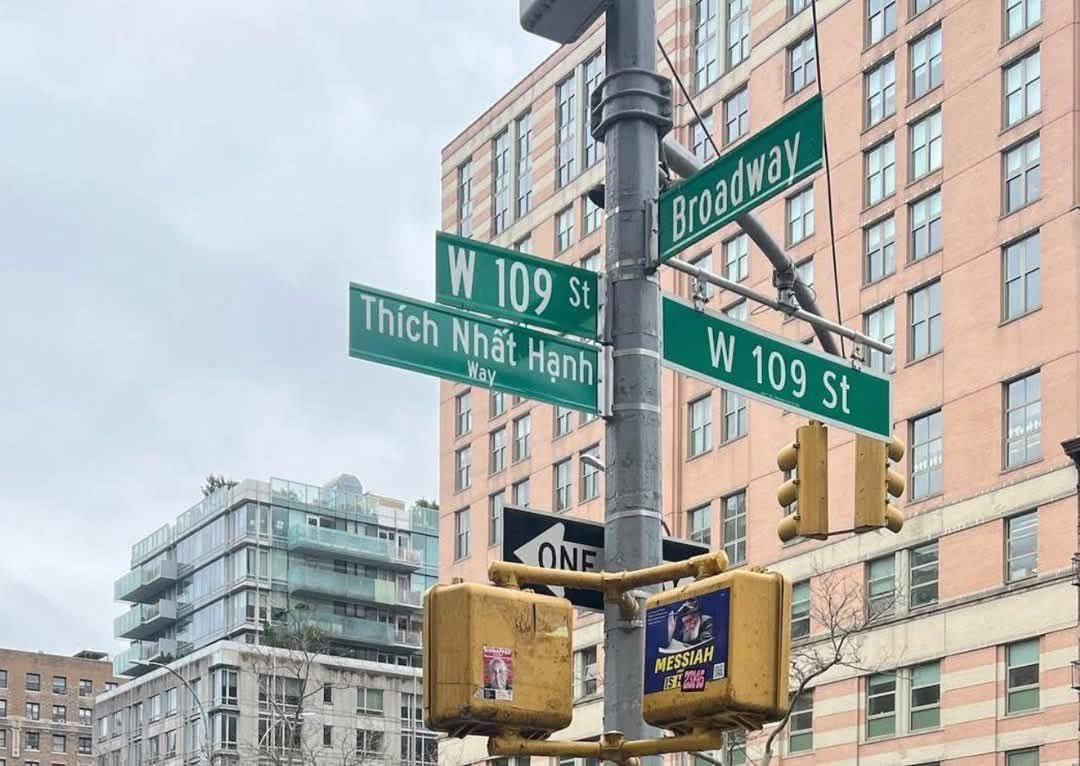Pháp Nhãn Temple Ven. Thích Trừng Sỹ

.
THE RITUAL OF TRANSMITTING, RECEIVING, AND PRACTICING THE TEN ETHICAL PRECEPTS OF THE NOVICE
Namo Tassa Bhagavato Arahato Samma SamBuddhassa
(Bell, 3 times)
Respectfully pay homage to the Buddha: The World-Honored One, the Worthy One, the Exalted One, the Fully Awakened and Enlightened One. Namo Buddhaya.
Respectfully pay homage to the wonderful Dharma of the Buddha, the path of practicing peace, joy, happiness, love, and understanding for the many right in the present life. Namo Dharmaya.
Respectfully pay homage to the harmonious and peaceful Sangha of the Buddha, the Community of cultivated people who vow to live their lives of virtue, meditation, wisdom, deliverance, and deliverance with right understanding to benefit oneself and other people right here and right now in the present life. Namo Sanghaya.
Namo The Original Master Sakyamuni Buddhaya. (Bell)
Praising the Buddha
As wonderful as the lotus flower,
As bright as the northern star,
Let us come back and take refuge in
the Teacher of gods and human beings.
The precious lotus blossoms on the enlightened pedestal
the halo shines in all directions.
Wisdom goes beyond the dharma realms,
Loving-kindness and compassion permeate all the mountains and rivers.
I have just seen the Buddha’s perfect countenance,
I respectfully offer the Buddha my whole sincere heart,
I forward wholeheartedly to praise for the Noble Triple Gem
Diligence in the Dharma path is well cultivated.
Namo Buddhaya.
Respectfully pay homage to the Noble Triple Gem
The Buddha, who is the fully Awakened and Enlightened One,
Shows the way of peace to living things and living beings,
has the virtuous, good, and noble signs,
The Buddha’s wisdom and compassion are perfect.
We, disciples of Gautama Buddha, wholeheartedly pay homage to the Buddha forever present in the three lifetimes and ten directions. (Bell, one prostration)
The Dharma that is the bright way,
Instructs people to escape the realm of delusion,
Leads us to return to true home
In order to lead a life of awakening.
We, disciples of Gautama Buddha, wholeheartedly pay homage to the Dharma forever present in the three lifetimes and ten directions. (Bell, one prostration)
The Sangha that is the beautiful Community in harmony
Travels on the joyful path together,
Cultivates to be freed from afflictions
In order to make life beautified.
We, disciples of Gautama Buddha, wholeheartedly pay homage to the Sangha forever present in the three lifetimes and ten directions. (Bell, one prostration)
We rely on the Triple Gem
on the path of Dharma learning,
know the Triple Gem of self-own mind,
vow to practice the Dharma diligently
in order to illuminate the heart of the Noble Triple Gem.
The meaning of repentance
Sins arising from the mind also need the mind to show repentance.
When the mind is already purified, sins are immediately gone.
The dispelled sins and the purified mind get empty.
It is called the truthfulness of showing repentance.
Namo Bodhisattva Sincerely Finding Repentance.
Explaining the meaning of repentance
This physical body is like a vase that holds many different types of water in life. As an intelligent person, I use this vase to make flowers and to store new water and change the old water by regularly cleaning and tidying it up.
Likewise, as an awakened person, I skillfully use this physical body to beautify life, to develop good things for life, to know how to recognize and repent of mistakes I have made. I vow not to repeat the old mistakes. Aware of that, every day I diligently learn and practice the Buddha’s teachings by doing good things, saying good things, and thinking about good things to benefit living things and living beings.
The new water in the vase represents mistakes or faults that have been purified, recognized, and transformed. The old water in the vase represents mistakes that have been made.
The vase represents the physical body. Relying on your physical body to benefit oneself and other people right here and right now in the present life by applying and practicing the Buddha Dharma to live a life of morality, meditation, and wisdom in the daily life to benefit the many right in this world.
Touching the earth with the four kinds of Gratitude
1. With deep gratitude to the Dharma Teachers who have instructed me in a life of wisdom, virtue, and meditation, bowing the head to pay homage to the Triple Gem, permanently residing in the three lifetimes and ten directions. (Bell, one prostration)
2. With deep gratitude to the Parents who gave me birth, upbringing, education, and this physical body, bowing the head to pay homage to the Triple Gem, permanently residing in the three lifetimes and ten directions. (Bell, one prostration)
3. With deep gratitude to the alms donors and givers, who have supported me with pure food, drinks, medications, money, and materials, bowing the head to pay homage to the Triple Gem, permanently residing in the three lifetimes and ten directions. (Bell, one prostration)
4. With deep gratitude to all people, all species, all things, including the air, the light, the peaceful country, etc., bowing the head to pay homage to the Triple Gem, permanently residing in the three lifetimes and ten directions. (Bell, one prostration)
Taking refuge in the Triple Gem
I take refuge in the Buddha, the One who shows me the way of loving-kindness, compassion, and wisdom in lifetime.
I take refuge in the Dharma, the way of practicing peace, joy, happiness, understanding, and love for the many right in the present life.
I take refuge in the harmonious and peaceful Sangha of the Buddha, the Community of those who vow to live their lives of virtue, meditation, wisdom, deliverance, and deliverance with right understanding to benefit oneself and other people right here and right now in the present life.
May the World-Honored One happily regard and accept me as the well-trained disciple of the Buddha. From now until my whole life, I determine to take refuge in the Buddha, the Dharma, and the Sangha. (Bell)
I take refuge in the Dharma, the way of practicing peace, joy, happiness, understanding, and love for the many right in the present life.
I take refuge in the harmonious and peaceful Sangha of the Buddha, the Community of those who vow to live their lives of virtue, meditation, wisdom, deliverance, and deliverance with right understanding to benefit oneself and other people right here and right now in the present life.
May the World-Honored One happily regard and accept me as the well-trained disciple of the Buddha. From now until my whole life, I determine to take refuge in the Buddha, the Dharma, and the Sangha. (Bell)
Receiving the Ten Ethical Precepts of the Novice
This is a sacred and precious moment to receive the ten novice precepts, to vow to become a disciple of the Buddha, and to apply the Buddha’s teachings deeply into daily life. Please answer yes, I am determined to do it. Every time the teacher asks you questions related to your practice.
The first virtuous precept is to protect life
1. Being aware that the sufferings caused by killing, I would like to follow the virtues of great loving-kindness and compassion to protect the lives of all people and all beings. I vow not to kill the lives of beings, disapprove of killing and not let others kill, whether in my mind or in my daily way of life. I vow not to kill myself, not to kill sentient beings by myself, not to tell people to kill sentient beings, and not to see whoever kills sentient beings that I rejoice.
This is the first ethical training. Do you vow to receive and practice this precept? Yes, I do. (Bell)
This is the first ethical training. Do you vow to receive and practice this precept? Yes, I do. (Bell)
The second virtuous precept is to respect the private properties of others
2. Being aware of the sufferings caused by deception, robbery, and social injustice, I would like to learn the virtues of great loving-kindness and compassion to bring the joy of life and well-being to everyone and everything, to share my time and capacity to those in need. I vow not to take any property of individuals or collectives to make my own property. I vow to respect the private possessions of others, and also vow to prevent others from dishonestly hoarding and enriching them on the sufferings of all people and all species.
This is the second ethical training. Do you vow to receive and practice this precept? Yes, I do. (Bell)
This is the second ethical training. Do you vow to receive and practice this precept? Yes, I do. (Bell)
The third virtuous precept is to protect chastity of Dharma practitioners
3. Being aware that the practitioner’s noble ideal can only be accomplished with the complete removal of attachments and ties to sensual love, I vow to keep myself so pure, protect myself with my virtuous life and wholeheartedly protect the chastity of others. I know that the act of sexual lust not only destroys my life and my monastic will, but also harms the lives of others, and prevents me from fulfilling my ideal of saving sentient beings. For lay people, when they grow up, they get married, but for those who have the will to leave their secular life for monastic life live a simple and free life, are not being involved in a family, are not bound by the family life, and spend a lot of time learning and practicing the Buddha Dharma to benefit many people.
This is the third ethical training. Do you vow to receive and practice this precept? Yes, I do. (Bell)
This is the third ethical training. Do you vow to receive and practice this precept? Yes, I do. (Bell)
The fourth virtuous precept is to practice right speech and listening
4. Being aware that suffering and unhappiness are caused by speech of lacking mindfulness, I vow to learn the virtues of right speech and listening in order to offer other people joy and help them alleviate suffering. Knowing that the right speech can bring happiness to people, and wrong speech can cause suffering for them, I vow to only say the right speech so that I can create more confidence, happiness, and prestige for many people.
I vow not to say something wrong with the truth, not to say words that cause divisions and hatred. I vow not to spread the news that I am not sure is true, not to criticize and condemn things I do not know well. I vow to practice listening with compassion in order to be able to understand the sufferings and difficulties of others and to alleviate their sufferings. I vow not to say the discordant things that can cause divisions and disruptions in the community of my Dharma learning and cultivation. I vow to practice the right speech to build sisterhood and brotherhood in the spirits of harmony, reconciliation, solidarity, mutual assistance, mutual affection, mutual love, and mutual respect.
This is the fourth ethical training. Do you vow to receive and practice this precept? Yes, I do. (Bell)
I vow not to say something wrong with the truth, not to say words that cause divisions and hatred. I vow not to spread the news that I am not sure is true, not to criticize and condemn things I do not know well. I vow to practice listening with compassion in order to be able to understand the sufferings and difficulties of others and to alleviate their sufferings. I vow not to say the discordant things that can cause divisions and disruptions in the community of my Dharma learning and cultivation. I vow to practice the right speech to build sisterhood and brotherhood in the spirits of harmony, reconciliation, solidarity, mutual assistance, mutual affection, mutual love, and mutual respect.
This is the fourth ethical training. Do you vow to receive and practice this precept? Yes, I do. (Bell)
The fifth virtuous Precept is to protect and nourish the body and mind by not taking intoxicants, drugs, and not consuming toxic products
5. Being aware that the sufferings and unhappiness caused by the use of intoxicants, drugs, and toxins and prevent me from mastering my body and mind, I vow to practice mindfulness in eating, drinking, and consuming healthy things to bring peace and joy to the body and mind. I vow not to use intoxicants, drugs and not to consume toxic products including books, magazines, and films containing violence, fear, lust, and hatred.
This is the fifth ethical training. Do you vow to receive and practice this precept? Yes, I do. (Bell)
This is the fifth ethical training. Do you vow to receive and practice this precept? Yes, I do. (Bell)
The sixth virtuous Precept is not to use cosmetics and jewelry
6. Being aware of the true beauty of a Dharma practitioner is the nature of stability and freedom, I vow every day to beautify the Sangha and me by practicing mindfulness, namely the observance of the precepts, disciplines, and dignities in everyday life. I know the cosmetics and jewelry that people use can only bring fake glamor to the outside, and only have the effect of causing depravities and entanglements, so I vow to live a simple, neat, and clean life in the way of my dress. I vow not to use kinds of perfumes, lipstick, cosmetics, and other jewelry.
This is the sixth ethical training. Do you vow to receive and practice this precept? Yes, I do. (Bell)
This is the sixth ethical training. Do you vow to receive and practice this precept? Yes, I do. (Bell)
The seventh virtuous Precept is not to be entangled in worldly entertainments
7. Being aware not to join and cling to styles of secular entertainments and pastimes, such as online electronic games, debauched and violent films, news, stories, books, newspapers, and songs of deep sorrow and grief, and vice versa, I am aware to contact and learn about educational, moral, and scientific films, news, stories, books, newspapers, songs of meditation and the Dharma. So I try to spend a lot of time studying, applying, and practicing the Buddha Dharma in my daily life to benefit myself and other people right here and right now in the present life.
This is the seventh ethical training. Do you vow to receive and practice this precept? Yes, I do. (Bell)
This is the seventh ethical training. Do you vow to receive and practice this precept? Yes, I do. (Bell)
The eighth virtuous Precept is not to live a life of luxurious and sumptuous material
8. As a good practitioner, I am aware that living in luxurious, sumptuous, and material conditions will easily arouse craving, arrogance, and sensual desire. I vow my whole life to live only a life of simpleness, little desire, contentment, and treasuring what I have. I vow not to sit and lie on gorgeous chairs and beds, not to use silk, brocade, satin, shiny vehicles, and luxurious houses.
This is the eighth ethical training. Do you vow to receive and practice this precept? Yes, I do. (Bell)
This is the eighth ethical training. Do you vow to receive and practice this precept? Yes, I do. (Bell)
The ninth virtuous Precept is to develop compassion, vow to eat vegetarian food, and not to eat outside the meals of the Sangha
9. In order to stay healthy and prevent disease effectively, I vow not to eat fish and types of animal meats. Being aware that the necessities of maintaining health, living in harmony with the Sangha, nurturing and developing loving-kindness and compassion, I vow my whole life to eat vegetarian food and not to eat outside of the Sangha’s meals, except when being sick.
This is the nineth ethical training. Do you vow to receive and practice this precept? Yes, I do. (Bell)
This is the nineth ethical training. Do you vow to receive and practice this precept? Yes, I do. (Bell)
The tenth virtuous Precept is not to accumulate money, wealth, and Jewelry
10. Being aware that the happiness of the cultivated practitioner is made of cultivation materials of the ability and freedom. I vow not to let money, jewelry, and wealth interfere with my spiritual path. I vow not to accumulate money, wealth, and jewelry, not to look for happiness in the accumulation of money, wealth, and jewelry because they cannot guarantee and protect my safety and security. Being well aware of that, as a good practitioner, I am determined to find true happiness in Dharma learning, Dharma practice, Dharma joy, and Dharma happiness.
This is the tenth ethical training. Do you vow to receive and practice this precept? Yes, I do. (Bell)
This is the tenth ethical training. Do you vow to receive and practice this precept? Yes, I do. (Bell)
A few Instructions to Start Shaving the head hair and beard
Dear loved Dharma Practitioner,
As we know, for secular people, hair and beard are the roots of humanity; but for monastic people, hair and beard symbolize afflictions. Shaving off hair and beard means shaving off afflictions on the body.
Today, you have enough good conditions to remove the afflictions in your body. To eliminate afflictions in your mind, you need to study the Dharma, understand the Dharma clearly, practice, and apply the Dharma in the daily life to benefit yourself and other people right here in the present life.
You should know that monastics must shave all head hair and beard completely differently from secular people, do not wear secular clothes, and do not wear silk jewelry or luxurious brocade in a secular style. Be aware that the true beauty of a monastic person must be made of stately materials and the practice of harmony, peace, stability, and freedom through Dharma learning, Dharma practice, Dharma understanding, Dharma joy, and Dharma happiness.
Now, you are very lucky to vow to shave off your beard, hair, and give up bad habits from within your mind under the support and witnesses of the Sangha at Pháp Nhãn Temple. Today you officially become a true novice Monk, a devout disciple of the Buddha in the new era.
To support the shaving of your head hair, beard, and novice ordination ceremony today, we would like to invite the Sangha to recite the following verse together happily.
As we know, for secular people, hair and beard are the roots of humanity; but for monastic people, hair and beard symbolize afflictions. Shaving off hair and beard means shaving off afflictions on the body.
Today, you have enough good conditions to remove the afflictions in your body. To eliminate afflictions in your mind, you need to study the Dharma, understand the Dharma clearly, practice, and apply the Dharma in the daily life to benefit yourself and other people right here in the present life.
You should know that monastics must shave all head hair and beard completely differently from secular people, do not wear secular clothes, and do not wear silk jewelry or luxurious brocade in a secular style. Be aware that the true beauty of a monastic person must be made of stately materials and the practice of harmony, peace, stability, and freedom through Dharma learning, Dharma practice, Dharma understanding, Dharma joy, and Dharma happiness.
Now, you are very lucky to vow to shave off your beard, hair, and give up bad habits from within your mind under the support and witnesses of the Sangha at Pháp Nhãn Temple. Today you officially become a true novice Monk, a devout disciple of the Buddha in the new era.
To support the shaving of your head hair, beard, and novice ordination ceremony today, we would like to invite the Sangha to recite the following verse together happily.
Verse of the shaving of head hair and beard
Shaving off head hair and beard
Praying peace for sentient beings
Eliminating afflictions and suffering
Developing happiness and quickly advancing to Nirvana.
Praying peace for sentient beings
Eliminating afflictions and suffering
Developing happiness and quickly advancing to Nirvana.
Putting on Monastic Daily Robe
How beautiful is the robe of deliverance,
The robe of the blessing field is marvelous.
Today I am very lucky to put it on,
The wholesome root is for me to vow to plant deeply.
The robe of the blessing field is marvelous.
Today I am very lucky to put it on,
The wholesome root is for me to vow to plant deeply.
Wearing the monastic robe,
My heart is at ease.
I vow to live a life of freedom,
bringing joy and peace to the world.
My heart is at ease.
I vow to live a life of freedom,
bringing joy and peace to the world.
Putting on the Sanghati or Kasa Robe*
(Please kneel down and raise the robe across the forehead)
How wonderful is the robe of freedom,
The robe of the field of merit is marvelous.
I bow my head to receive it happily
I vow to wear it for my whole lifetime.
The robe of the field of merit is marvelous.
I bow my head to receive it happily
I vow to wear it for my whole lifetime.
Namo Buddhaya. Namo Dharmaya. Namo Sanghaya. (Bell)
(* Sanghati or Kasa is the robe the monastic people wear on formal occasions.)
Sharing the Merit
May the merit of cultivation today
Be direct toward all living things, and living beings
We and human beings
Can realize the Buddha’s way together.
Be direct toward all living things, and living beings
We and human beings
Can realize the Buddha’s way together.
Express diligent vows and pay thankful respects to the Triple Gem
We, disciples of Gautama Buddha, are always aware of ourselves by day and by night, constantly practice and recollect the light of the Buddha. Namo Buddhaya. (Bell, one prostration)
We, disciples of Gautama Buddha, are always aware of ourselves by day and by night, constantly practice and recollect the light of the Dharma. Namo Dharmaya. (Bell, one prostration)
We, disciples of Gautama Buddha, are always aware of ourselves by day and by night, constantly practice and recollect the light of the Sangha. Namo Sanghaya. (Bell, one prostration)
May we be well,
May we be happy
May we be healthy
May we be peaceful
May we be free from suffering, greed, anger, delusion, hatred, violence, ignorance, wrong view, etc.
May the Buddha and Bodhisattvas bless and protect all anytime and anywhere.
Bodhi, the wonderful Dharma of the Buddha turns noble and stately.
According to the place where I dwell strongly in Dharma learning, Dharma practice, Dharma understanding, and Dharma joy, I feel forever happy and peaceful.
We, disciples of Gautama Buddha, are always aware of ourselves by day and by night, constantly practice and recollect the light of the Dharma. Namo Dharmaya. (Bell, one prostration)
We, disciples of Gautama Buddha, are always aware of ourselves by day and by night, constantly practice and recollect the light of the Sangha. Namo Sanghaya. (Bell, one prostration)
May we be well,
May we be happy
May we be healthy
May we be peaceful
May we be free from suffering, greed, anger, delusion, hatred, violence, ignorance, wrong view, etc.
May the Buddha and Bodhisattvas bless and protect all anytime and anywhere.
Bodhi, the wonderful Dharma of the Buddha turns noble and stately.
According to the place where I dwell strongly in Dharma learning, Dharma practice, Dharma understanding, and Dharma joy, I feel forever happy and peaceful.
Sadhu, lành thay, well-done, and excellence.
Namo Buddhaya. Namo Dharmaya. Namo Sanghaya.
Namo Buddhaya. Namo Dharmaya. Namo Sanghaya.
(Bell, bell, bell)
.
.
Facebook Comments Box

